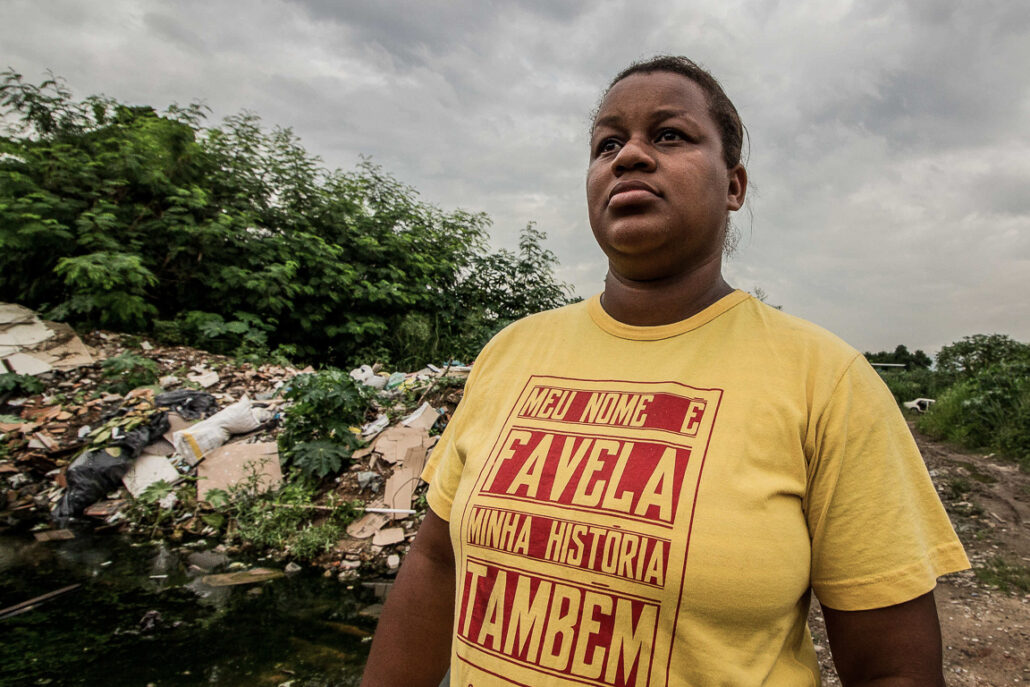
Clique aqui para Português
This is the second of a two-part article about the twelve-year struggle for housing by Favela da Skol residents, revealing Rio de Janeiro’s political backstage during an election year. With direct and indirect reflections of the mega sporting events in the social space of favelas in Complexo do Alemão, in this second part we hear about the families still waiting for the return of their houses destroyed by the State.
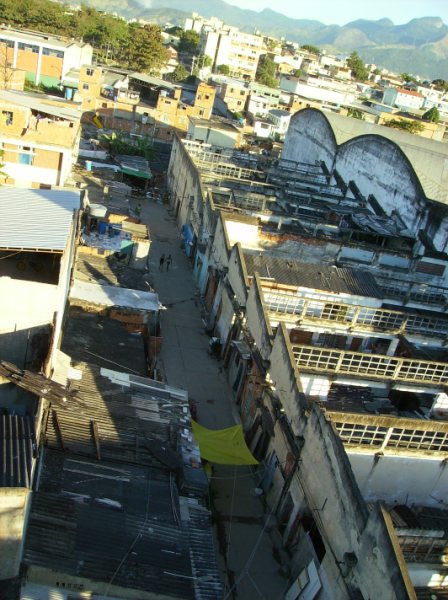
For the residents of Favelinha Skol, the struggle for housing rights began in 2010 when 600 families were forcibly evicted by the Rio de Janeiro state government. At the time, Governor Sérgio Cabral was reelected in the first round in a historic vote.
For over twelve years since then, on top of government neglect, families have had to fight to prove they exist. All this in the midst of the economic decline and dismantling of Rio de Janeiro following the mega-events of the 2014 World Cup and 2016 Olympic Games, a process reinforced by the coronavirus pandemic and a political crisis. The Rio state government changed hands six times, with five governors in six years: Sérgio Cabral, Luiz Fernando Pezão, Francisco Dornelles, Wilson Witzel and Cláudio Castro. With the exception of Dornelles, all were investigated, denounced or arrested for corruption.
Two governors were arrested on charges of embezzlement and corruption. Cabral (2007-2014) left office in March 2014 to run for a seat in the national Senate. Following his resignation, on April 4, 2014, Luiz Fernando Pezão (2014-2019), vice-governor at the time, was sworn in.
On October 26, 2014, Pezão was re-elected governor. Later he stepped down from office for health reasons between March and October 2016 with this vice-governor, Francisco Dornelles (2016 and 2018-2019), taking over.
Recovering from his health condition, Pezão returned to the position of governor, but was arrested in November 2018 during Operation Boca de Lobo, a phase of the corruption investigation, Operation Car Wash, in Rio. Vice-governor Francisco Dornelles, 83 years old at the time, once again took over the state government.
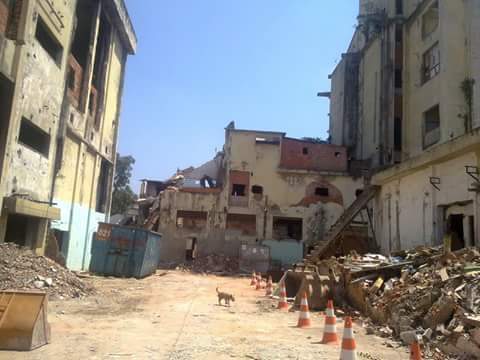
This mess in the political, economic and productive chess game that is Rio politics shook up all the pieces, especially the most vulnerable ones. Camila Moradia, one of the main leaders of the housing movement in Complexo do Alemão, recalls:
“[At the time], all state debts were paid by [judicial] seizures and whoever managed to do it first got paid. This meant that everything related to social rent got messed up. We had people who were seven months late receiving payments, starving and going to live on the street, with nothing else they could do… Then, the pandemic came, tearing everything up, paralyzing everything.”
According to her, community organizing was the only way out. “That was what unified the struggle, because people started to suffer a lot and joined. They saw that if we didn’t shout for ourselves, no one would listen.”
Dornelles governed this crisis in Rio de Janeiro until the start of the Wilson Witzel administration (2019-2021). Witzel was elected in 2018 and took office on January 1, 2019. However, he was removed from office on August 28 of the following year by decision of the Superior Court of Justice (STJ) due to strong evidence of participation in corruption schemes. Thus, Vice-Governor Claudio Castro took over as interim governor for eight months.
However, by unanimous vote, the Special Mixed Court sentenced Witzel to the loss of office for a crime of responsibility due to irregularities in the Health Department during his management, informed by the arrest of Secretary Edmar Santos who entered a plea bargain citing the governor. Thus, on May 1, 2021, Claudio Castro (2020-present) definitively assumed the governorship.
In the 2022 elections, Castro, formerly of the Social Christian Party (PSC)—the party of Witzel, Edmar Santos and Pastor Everaldo—was re-elected governor as a member of the Liberal Party (PL), the same party as President Jair Bolsonaro. [Though some political parties have been terminated, others changed their names, and still others established since it was published, to understand Brazil’s web of political parties, see this backgrounder.]
At the federal level, the residents of Favela Skol were also witness to four power shifts that directly affected their situation.
When they were first evicted in 2010, Luis Inácio “Lula” da Silva (2003-2010), was in his second term as president of Brazil. On January 1, 2011, Dilma Rousseff (2011-2016) took office as the new president, replacing Lula, and maintaining the Workers’ Party (PT) mandate for the country’s most important office. However, Dilma was impeached on August 31, 2016.
That is when then Vice-President Michel Temer (2016-2018), of the Brazilian Democratic Movement (MDB), took office, transitioning the Executive from a center-left government to a right-wing government. And later, with the victory of Jair Bolsonaro (2019-2022), Brazil began to be ruled by the extreme right.
Social Vulnerability
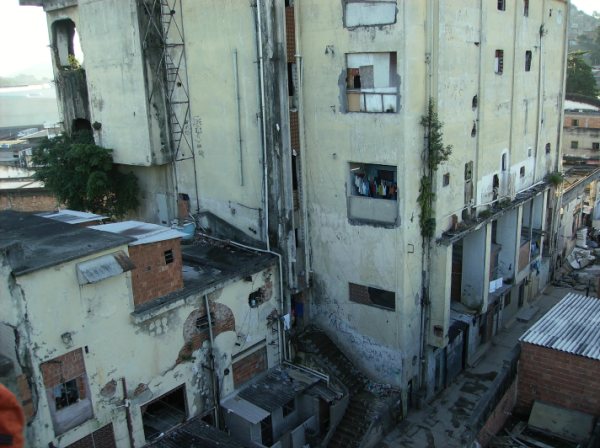
It is important to note that the construction of housing units in Complexo do Alemão by the Growth Acceleration Program (PAC) also had a direct impact on the lives of residents. Not only because of the evictions, but also due to the increase in cost of living in Complexo do Alemão, of up to 300%, according to the newspaper Extra.
Residents removed from Favela Skol receive social rent of R$400 (US$75) per month, well below the cost of rent in market housing. It is essential to note that the value of social rent disbursements has not increased since 2010, where market housing costs have reached record highs in recent decades.
In 2010, the social rent value was already low, representing 78.4% of the minimum wage, which, until December 2010, was R$510 (US$95.70). Today, the same R$400 represents only 33% of the minimum wage of R$1,212 (US$227.44) per month, an absurd drop in the purchasing power of this aid.
According to calculations by the Inter-Union Department of Statistics and Socio-Economic Studies (Dieese), an average family’s expenditure on food represents 48.51% of the minimum wage.
According to the General Market Price Index (IGP-M) calculated monthly by the Getúlio Vargas Foundation (FGV), the value of social rent should have undergone a total increase of 156% over the last twelve years, according to the Brazilian Central Bank’s citizen’s calculator. If the value were corrected based on the IGP-M, assistance to families to pay rent would now be R$1,024.39 (US$192.23) per month. That is, a social rent payment would be almost equivalent to a minimum wage payment.
The impacts of homelessness bring additional “invisible” social consequences. Since families cannot prove their address, either because they are staying with relatives or friends or due to constant changes of address linked to the cost of rent, they have difficulties enrolling their children in school, finding jobs and having a decent salary to support themselves, as well as accessing doctors from the Family Health Clinics whose teams are divided territorially for patient care.
To make matters worse, this context exposes the families removed from Favela Skol to a situation of extreme social vulnerability. Beyond that, without a home, these families became invisible to the state bureaucracy, in a veritable data blackout.
Excluded
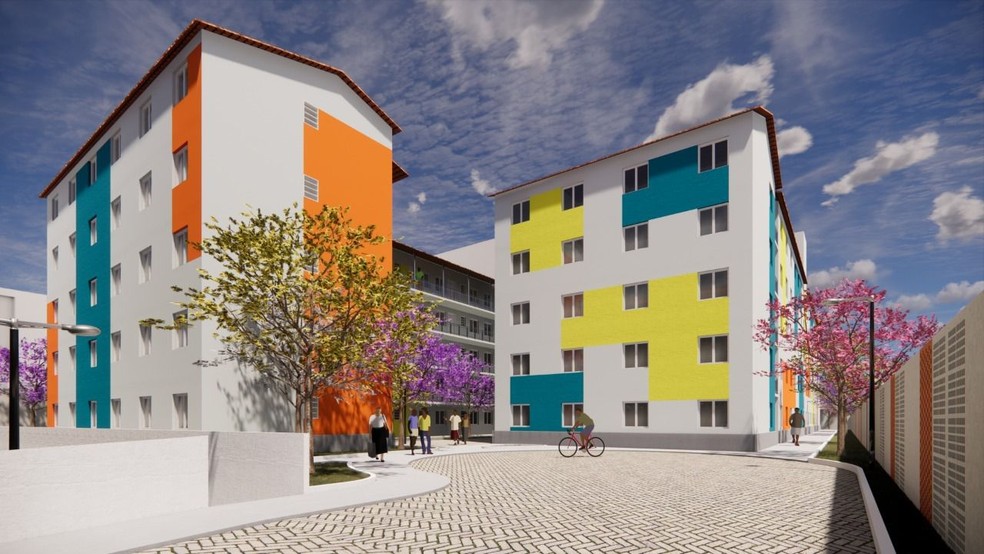
According to newspaper Correio Braziliense, the predicted cost in the federal budget for projects in Complexo do Alemão by the PAC was R$832.9 million (US$156.13 million). This amount would go to building housing units to settle evicted residents, for the cable car, and for infrastructure works in the community.
According to the project, all previously evicted residents would be allocated housing in the newly built complexes located in Poesi (Estrada do Itararé, in Ramos), in the Área do Gás (Heliogás), in Entorno 1 (Avenida Itaóca, 1.174), in Entorno 2 (Avenida Itaóca, 1833) and in Morro do Adeus.
However, Favela Skol was located on another stretch of Avenida Itaóca, close to the Café Capital factory, about 400 meters further away from the area where those removed from Complex do Alemão had lived.
Although the occupation already existed in the period between 2008 and 2010, Favela Skol was not along the five-station cable car route that connects Complexo do Alemão to the neighborhood of Bonsucesso and which determined which evictees were included as recipients of the housing units built by the PAC. For Camila Moradia’s family and others from Favela Skol forcibly evicted by the State, there was no housing plan that included them.
“We waited a year or so for the new homes to be delivered after we were evicted, but nothing happened. I was not yet a member of the residents’ association though we saw the association as our legitimate representatives. In late 2012, I started demanding from these representatives for something to happen. They always asked us to keep calm and wait, but 2013 came and nothing. In the midst of that, we had new elections. We tried to get [politicians] to make commitments, but that didn’t happen,” recalls Camila Moradia.
Only on May 4, 2015, during a public hearing to investigate human rights violations linked to the Pacifying Police Units (UPPs) in Complexo do Alemão, did the Skol families come into existence, at least in the eyes of the Rio de Janeiro state government. Camila Moradia describes:
“When the security hearing happened within Complexo do Alemão, we summoned all the homeless families and decided that, in the middle of the hearing, we would go in and speak and that someone would have to attend to us. We didn’t get the opportunity to speak [at the hearing], but I always say that it was the first official day of our struggle, because we got visibility. Voz das Comunidades went with us and we got the first official press coverage about the struggle by a community newspaper.”
Despite not being able to speak at the hearing, Camila Moradia learned of the 392 families removed by the State of Rio and the federal government in Morro do Adeus, within Complexo do Alemão, due to the cable car projects. They also got the attention of the Rio de Janeiro Public Defenders’ Office.
On May 23, 2015, all victims of unfulfilled housing promises in Complexo do Alemão were invited to an event held in the community by the Public Defenders’ Office. However, nothing was resolved in the following year.
The political and economic crisis got even worse. Social rents were delayed every month, reaching the peak of residents not receiving the benefit for seven months. “That’s when we really intensified the struggle. We started to participate in meetings everywhere, no longer counting on the association alone to represent us or to participate in these meetings. We even went to meetings and said that we didn’t feel represented by the association,” says Camila Moradia.
The period is seen by her and other families as “the worst years of our lives,” because with the economic and political crisis in the State of Rio, between 2016 and 2017, they only received social rent when there was an attachment order.
An attachment order is a preventive judicial measure determined by a judge with the purpose of seizing the debtor’s assets to guarantee the creditor the receipt of his credit. In the case of Rio de Janeiro, money that entered the State’s account was blocked from release from managed accounts to meet demands related to the payment of salaries of active and inactive civil servants, in addition to the lack of payment of service providers, and interim authority measures that define priorities in the application of public resources.
At this moment in the struggle, residents sought partnership with other housing movements in Rio de Janeiro and Brazil. With the support of the Homeless Workers Movement (MTST), they occupied the Rio de Janeiro State Public Works Company (EMOP), which is responsible for public works projects carried out by the State.
Camila Moradia describes:
“When we organized this occupation at EMOP, we invited everyone who was on social rent in Complexo do Alemão to come. When we called on people to join the fight, we discovered that families that had been removed for the cable car construction were going through the same things as we were, from Favela Skol. The cable car began construction in 2008. We have families here in Complexo do Alemão who have been on social rent for 14 years, because they were removed by the State and are still homeless. There are 392 families in all.”
“You Exist?”
The MTST invited the committee of residents fighting for housing in Complexo do Alemão to go to the federal capital of Brasília to attempt a meeting with the Ministry of Planning, Budget and Management, the Ministry of Finance and the Office of the Chief of Staff. At the time, Camila Moradia had just become a mother again and was unable to travel. She currently has three children, and recalled: “I thought: how am I going to convey all this?”
That’s when she had the idea of “writing a personal letter” to be delivered in Brasília. “I reported on all the housing situations and processes and made specific demands for each family, in each group,” she emphasizes.
The strategy worked, but it revealed to everyone’s surprise and indignation that the people evicted from Favela Skol did not exist on the federal government’s register. “We thought we had been removed by [federal works program] PAC 1 to benefit from PAC 2, but when we went to Brasília, we found out that we were not allocated to any housing program at the federal level. That was already 2016!” says Camila Moradia.
In Brasília, the residents’ commission met with the Housing Secretary at the time and with the Minister of Cities himself. The authorities insisted that there were no more families waiting for housing units in Complexo do Alemão: “No, in Alemão, all the families that needed a home have already received one,” says the activist, relaying what the government said. And they asked: “Do you exist?”
From that point on, residents removed from Favela Skol and Morro do Adeus (due to the cable car projects) began the saga of presenting various documents to prove that “yes, we exist!”
She describes:
“We printed a photo of the existing social rent portal, with the names of everyone who receives social rent, and sent it to the Ministry and the Secretary. I still have this email today. But once again we were told that we were not allocated any federal housing program. And then we really had to prove our existence.”
From Chess to Monopoly
Camila Moradia also reports that the residents faced months of “buck-passing,” as the government of Rio did not pass on the correct information to the federal government, which claimed to only be able to look at the case “once it gets to Brasília.” There was no data on the forced eviction of Favela Skol, nor a request for inclusion in the federal government’s housing program, according to the activist.
Residents requested a meeting be scheduled between the state and federal executive branches. When it was finally scheduled, in Rio de Janeiro, Moradia was prevented from entering as a representative of the movement by the Rio State Government:
“When I got to the door, I couldn’t get in. I called the national housing secretary. They [State of Rio de Janeiro] boycotted our presence, but when [the national housing secretary] arrived, she took us inside saying that I was with her. That’s when it officially began for them—I mean, for the federal government—in November 2016, with the official promise to return our homes. It was only then that we came to exist! It was also when we finally went through a re-registration process, the first registration in six years. Only then did we start sending documents: we were evicted just handing over an identity card and getting a check for R$400 (US$75). We didn’t know anything about how it worked. It was then that we found out that the Rio State Government had the process all wrong.”
The re-registration process was long and took months, as many evicted families no longer had the required documents such as birth certificates, marriage certificates, etc. Then, with the impeachment of Dilma Rousseff and the swearing in of Michel Temer, the entire case was paralyzed. Camila Moradia describes:
“We are able to fit into the Minha Casa Minha Vida (MCMV) federal housing program, which is to say that we fit into their ‘framework.’ So, we weren’t included in PAC 1, nor in PAC 2, and we ended up in MCMV 3, except there wasn’t any money left for that, right? The 2018 elections arrive and Jair Bolsonaro is elected president. On December 28, the process of releasing federal government funds for the construction of housing units for Complexo do Alemão residents was finally approved. But… the families’ ordeal continued.
We took another blow with Bolsonaro being elected. He ordered the entire process [of social housing programs in progress] to be audited and to suspend everything on the grounds that ‘it was all done last minute.’ He canceled everything. Then, once again, we start a process of changing government with Bolsonaro in the federal executive and Wilson Witzel as governor of the State of Rio.”
From there the board game changed again. They had to convince the State of its obligation to rehouse them as they had been evicted by the Rio de Janeiro state government with the consent of the federal government.
According to Camila Moradia, the government of Wilson Witzel never accepted a meeting with the Complexo do Alemão residents’ commission, even though he was elected governor of Rio de Janeiro with the support of President Jair Bolsonaro and with a significant share of the vote in favelas. “We spent the whole of 2019 trying to dialogue, trying to get in touch again to see how our case was going, but we couldn’t!”
Another old “new” year arrived for the residents of Complexo do Alemão, who had been fighting for over ten years to get their homes back. In March 2020, the global Covid-19 pandemic arrived in Brazil. “The pandemic tore through and stopped everything. There was no service, everything was stuck,” she describes.
Cláudio Castro, who became Rio’s state governor in August 2020, also ignored the residents for a year. It was only in July 2021 that the Complexo do Alemão residents’ commission (made up of six women, five of whom are black) finally managed to open a line of dialogue with the state government.
“I open a parenthesis to say that: we are in a board game and it may be that this board is being moved right now, because this year [2022] is a political year. I really do see it like that,” analyzes Camila Moradia.
The Beginning of the End?
Upon arriving at the Rio state government headquarters, Camila Moradia says she was surprised. Instead of a meeting, she and several leaders from Complexo do Alemão were met with lunch. “The impression we got was that they already knew everything we were going to say because of who was there: the secretary of public works and infrastructure, the secretary of transport, the secretary of science and technology, that takes care of state technical schools, etc.”
As an activist and community leader of the popular housing movement, she says she does not believe that the release of funds and start of works beginning construction of housing units for the displaced families would be able to be used as political capital in the 2022 elections.
The activist says that over these twelve years, almost 100 residents forcibly evicted by the State in Complexo do Alemão died without receiving their homes. She considers her current struggle real and urgent:
“I was 25 years old. Today I am 37. I had one daughter. Today she is 13 years old and I have two other children. People don’t understand anything about our case! We are homeless and just because it’s an election year doesn’t mean I should stop them building our housing project by saying: ‘It can’t be done now because it’s an election year and you’re not going to use it to get a vote.’ I’ve been homeless for twelve years! Some people have been without a home for 14 years! As much as it is an election year and he wants to win votes, our process is very old. It’s scary that some people think they have a way to block this politically… Because this isn’t a self-serving political fight… It’s a real fight! We are talking about 1,300 homeless families.
There are people who fight and take over other people’s fights, but that’s not our case. The fight is ours. We’re the ones who are homeless. There’s no way I can say ‘[this policy now] won’t do.’ I’m not Cláudio Castro and I’m not a right-wing person, but I can’t tell him not to do a project that is urgent because it’s an election year. I am homeless.”
Not even former president and current candidate Lula (Workers’ Party, PT) escaped criticism. “I’ve let him know that he did not supervise things properly during his term,” says Camila Moradia, without hiding that despite this, she will vote for the PT candidate. “I will vote for the possibility of dialogue and believing that if we have this dialogue we can participate and improve what he managed to do before. Along the way, it became clear that the problem was the State of Rio de Janeiro.”
Altogether, Camila Moradia and her children have moved 14 times in the last twelve years. She has already gone six months without paying rent, having to live off the generosity and understanding of the house owner. She describes:
“Some understand, and they manage to help us. Because the rent is also their income. So when you don’t pay rent, you despair because you might be taking something to eat out of someone’s mouth. But it makes no sense for me to pay the rent and not have enough to feed my children. It is a situation of humiliation and shame. That’s what we really feel. You don’t pay, then you pay as you can, or you kill yourself working three jobs and just vegetate. I’ve worked in telemarketing, from 8am to 2pm and then again from 5:40pm to midnight. I slept to be able to work.”
In Complexo do Alemão, popular movements for housing, education, youth and culture have come together to compile the People’s Plan for Complexo do Alemão, delivered to all political candidates in the 2022 elections who visited the neighborhood as part of their campaigning. Camila Moradia expressed:
“What I expect from candidates for the presidency, and especially from the governor and deputies of Rio de Janeiro, is a commitment to the favelas. All favelas. Commitment to life because those who live in favelas are tired of just surviving. We want to live.”
Camila Moradia is the daughter of a black woman who also fought for rights for the community. She grew up watching her mother and other black women fighting for their rights. Today, she is a human rights defender and works at the women’s support group in Complexo do Alemão: Mulheres em Ação no Alemão (MEAA). She said she doesn’t know what she’ll do first when her unit in the public housing apartment block is delivered and ready. She’s only sure of two things: “I just want in! I don’t care if it’s bare. I just want to go in and give each of my kids a wall. There are two bedrooms and three of them, so I promised that everyone will have a wall to decorate, adorn and use as they wish.”
